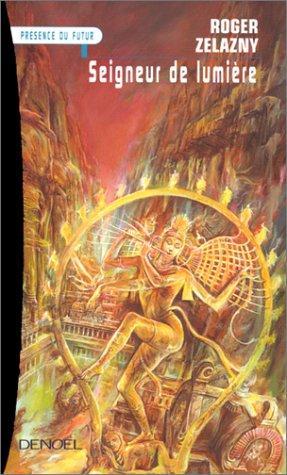cretinodicrescenzago reviewed Lord of Light by Roger Zelazny
Science fantasy orientalista degli anni Sessanta. Referto A
4 stars
[Vecchia recensione esportata da altro sito]
Iniziamo con una confessione: Lord of Light è un romanzo sì denso ma di lunghezza ottimale e di sicuro non occupa, di suo, un mese intero di lettura; mi è durato così tanto perché è il primo romanzo impegnativo cui mi sono dedicato da quando lavoro, e non avendo ancora il polso sui miei cicli di tempo libero l'ho dilazionato parecchio – cosa che sconsiglio caldamente, perché non è un testo episodico e richiede una lettura a ritmi abbastanza serrati.
Questo detto, veniamo al testo: l'ho recuperato come parte della mia monografia sulla grande fantascienza del Dopoguerra, conscio che è anche un capolavoro di science fantasy, e che dire: è capolavoro davvero. Siamo su una colonia umana su un altro pianeta in cui i capi anziani si sono deificati imitando il pantheon indù, per mantenere un comodo monopolio sulle tecnologie antiche e lasciare …
[Vecchia recensione esportata da altro sito]
Iniziamo con una confessione: Lord of Light è un romanzo sì denso ma di lunghezza ottimale e di sicuro non occupa, di suo, un mese intero di lettura; mi è durato così tanto perché è il primo romanzo impegnativo cui mi sono dedicato da quando lavoro, e non avendo ancora il polso sui miei cicli di tempo libero l'ho dilazionato parecchio – cosa che sconsiglio caldamente, perché non è un testo episodico e richiede una lettura a ritmi abbastanza serrati.
Questo detto, veniamo al testo: l'ho recuperato come parte della mia monografia sulla grande fantascienza del Dopoguerra, conscio che è anche un capolavoro di science fantasy, e che dire: è capolavoro davvero. Siamo su una colonia umana su un altro pianeta in cui i capi anziani si sono deificati imitando il pantheon indù, per mantenere un comodo monopolio sulle tecnologie antiche e lasciare le masse popolari in condizioni prendustriali... fino a che uno degli anziani non si stufa della situazione e decide di rifondare il Buddhismo come base spirituale per un progetto di "accelerazione tecnologica" – e già questa premessa trasuda genio. C'è una voce narrante affabulatrice con punte ironiche quale piace a me, ci sono dialoghi che ti risucchiano dentro come fossi il terzo in cotanto senno, le descrizioni degli ambienti si seguono con facilità (e ho verificato che sono io a non immaginare mai correttamente le scene entro le grotte...) e i tasselli di worldbuilding si compongono assieme poco a poco, così che ogni dato in partenza criptico prima o poi viene dettagliato; ottimo anche l'apparato critico con la sua utilissima precisazione "Dal capitolo 2 inizia un lungo flashback!" (dato che risparmia tanti mal di testa). In sostanza, una gioia continua.
Do "solo" 4/5, che in realtà sarebbe 4,5/5, per via di due dettagli: in primo luogo avrei preferito vedere in scena un nesso evidente fra le attività buddhiste e quelle accelerazioniste, anziché lasciare la cosa implicita come Zelazny ha scelto di fare; in secondo luogo mi rendo conto che la mia ignoranza sulla mitologia indù ha un po' inficiato le dotte e intriganti allusioni su cui si basa il romanzo, ergo urgerà documentarmi in merito e, in futuro, rileggerlo a ritmi serrati per rendergli giustizia. Magari subito prima o subito dopo aver recuperato Dune, che stando all'introduzione a Lord of Light ne è il romanzo "rivale e complementare".

